 Thanks: 0
Thanks: 0
Results 1 to 13 of 13
Thread: Bill Gates and Steve Jobs at D5
Hybrid View
-
 Bill Gates and Steve Jobs at D5 - 7
Bill Gates and Steve Jobs at D5 - 7
Continuation...
...
Steve: Thereís a lot of them surrounding entertainment, but thereís a lot of them that have to do with just sort of figuring how to navigate through life a little more efficiently. And I think, you know, itís really great when you show somebody something and you donít have to convince them they have a problem this solves. They know they have a problem, you can show them something, they go, oh, my God, I need this. And I think youíre going to see a lot of things like that happen over the next year or two.
Walt: You obviously have a very large Internet business with iTunes and you sell a lot of stuff in the Apple Store, but, you know, you were early with this idea that when you bought a computer from Apple, you had this kind of Internet service back end, and it was called ď.MacĒ. And I think a lot of people feel you havenít developed it very much.
Steve: I couldnít agree with you more, and weíll make up for lost time in the near future.
Walt: And in your case, you obviously have huge things like Hotmail, for instance, which is, I guessĖand Windows Messenger, which are both widely used and I donít even know how many users.
Kara: A gazillion.
Walt: Huge numbers. But on the other hand, as Steve Ballmer was talking about today, you know, other people have much stronger positions in things like search and other parts of the Internet. So are you guys, because you are the personal computer companies that are, you know, best associated with that, not as nimble as some of these competitors at this point? Do you worry about not being as nimble, both of you? I mean, obviously, Microsoftís a much bigger company, but youíre a big company, Steve, Apple is. Do you worry about not being as nimble as somebody sitting out there with, you know, the kind of ten employees that you guys had in 1977?
Bill: Well, thereís always going to be great new things that come out of other companies, and you want to be in a position to benefit from those, to have those inventions drive demand for Windows and personal computers and then some of those upstream things you want to participate in. I hope Steve mentioned we are going to participate in search, hopefully to a higher degree in the future than at present.
Walt: He did mention that, yeah.
Bill: So weíll see what we can do there. A lot of the applications are more specialized so theyíre not areas weíll go into. You know, take what can happen with education now that video is mainstream and all these tools that let you do rich interactions are very mainstream. Iím very excited about that. You know, the idea of empowerment goes back to the very beginning of our industry and some of those dreams that this would be used by students or that teachers could get better and learn from each other in these new ways, weíre just at the threshold where some of those things can happen. And, yes, our companies can contribute to that, but as a whole, itís the ecosystem jumping on and building on each other where you can finally say finally technology did something for education.
Steve: See, I look at this a little bit differently, which is, weíre not trying to do a lot of this stuff because itís not what we do. We donít think one company can do everything. So youíve got to partner with people that are really good at stuff. Like, weíre not, I mean, maybe Microsoft is great at search. Weíre not. Weíre not trying to be great at search so we partner with people that are great at search. And we donít know how to do maps on the back end. We know how to do the best maps client in the world, but we donít know how to do the back end so we partner with people that know how to do the back end. And what we want to do is be that consumerís device and that consumerís experience wrapped around all this information and things we can deliver to them in a wonderful user interface, in a coherent product.
And so in some cases, you know, we have to do more work than others. You know, in the case of iTunes, there wasnít a music delivery service that was any good and we had to do one, so weíll do one. But in other cases, thereís companies doing a way better job because weíre not as good at this stuff as other people are and weíd love to partner with them and so, you know, we selectively do that. And I think itís really hard for one company to do everything. Lifeís complex.
Kara: Letís talk about entertainment. Entertainmentís important to both your companies. For yours with music right now and as you get into Apple TV. Microsoft has been within the Hollywood era. Where do you see that going in the era of YouTube? Weíve had a couple of network people here talking about changes that are happening in Hollywood and everything else. What is happening now to entertainment delivery and where do you all play? Because youíll be the delivery mechanism in one way or the other for most people.
Bill: Well, the big milestone is where the delivery platform is the Internet and so you bring the richness and the interactivity. I think you can get a little bit of a glimpse of the future of TV more from looking at community-type things like Xbox Live, where people are talking to each other, finding friends, you know, watching things together, talking about those things.
As you map that onto genres like educational shows or sports shows or watching the Olympics, the elections, that ability to navigate becomes very, very powerful. And weíre not in entertainment. Yes, we do Halo, which is this big video game, but by and large, weíre a platform and so itís the tough software things, whether itís the speech or the ink or the deep graphics, thatís where things that take 10 years to get done, the IPTV stuff, the foundation there, you know, took ten years to get it done. Now itís finally coming to fruition and we have people like AT&T betting their company on putting that together.
So weíre just at the start of having a scale-entertainment delivery vehicle, both through PCs, unfortunately not connected up to the TV set in most cases, but thatís a point of innovation, and now things like IPTV and Xbox that are connected up in the living room.
Walt: Bill, you werenít here, but Steve showed a new function of Apple TV that brings YouTube directly to the TV. Is there going to be more of that from you? Do you see yourself the way Bill says, as an enabler of entertainment or, I mean, putting aside your Disney role, but your Apple role?
Steve: I mean, I think people want to enjoy their entertainment when they want it and how they want it, on the device that they want it on. So ultimately, thatís going to drive the entertainment companies into all sorts of different business models. And thatís a good thing. I mean, if youíre a content company, thatís a great thing. More people wanting to, you know, enjoy your content more often in more different ways, thatís why youíre in business, but the transitions are hard sometimes.
And, you know, the music industry, it turned out that the Internet got fast enough to download songs pretty easily. There was no legal alternative and maybe they made some bad choices in how they reacted to that, but, you know, theyíre still trying to make the transition to a very different way of doing business, or ways of doing business while theyíre under attack from piracy. And we can all highlight some of the mistakes that have been made, but, you know, still, itís a tough job.
And Hollywood, I think, you know, has watched whatís happened in music, learned some things to do, some things not to do, but, you know, theyíre still trying to map this out. How do they make some of these transitions, some new business models, different platforms, allowing their customers way more freedom on when they want to watch stuff and how they want to watch it. And I think thereís a tremendous amount of experimentation and thought going on thatís going to be good. Itís going to be really good if youíre a content owner.
Walt: Can I ask about the user interface of the personal computer for a minute? Vista has just come out, which is your best version of Windows youíve done, has some UI improvements in it. Youíre about to do yet another version of the Mac OS called Leopard in the fall, which, from what youíve shown publicly at least so far, has some improvements. But fundamentally, these are still the kind of file icon, folder icon, dropdown menu. I know Iím minimizing. Thereís a lot of other things. Thereís gadgets and widgets and all kinds of other cool things in there now, but, you know, you can see that itís still all built on what you started with, with what Xerox did research on.
In the offing in the next four or five years, is it possible thereís a new paradigm for organizing the user interface of the personal computer? Letís leave cellphones and things out for a minute, but just the personal computer. Bill?
...
jmcc's movie news: Red Dawn - RoboCop - The Witchblade - Neuromancer - ubuntu tribe - Possible Flatwoods monster movie
Flatland - Flatland: The Movie - Other users movie news: Blade Runner ---The Final Cut - I want to recommend: Perfume. The Story of a Murderer
Dayana - StefanŪa

-
 Bill Gates and Steve Jobs at D5 - 8
Bill Gates and Steve Jobs at D5 - 8
Continuation...
...
Bill: One of the things thatís been anticipated for a long time is when 3D comes into that interface. And there was a lot of experimentation, sites on the Internet where youíd kind of walk around and meet people, but in fact, the richness, the speed, it just didnít sustain itself. Now weíre starting to see with some of the mapping stuff, a few of the sites, that the quality of that graphics, the tools and things, are getting to the point where 3D can really come in. So Iíd definitely say that when you go to a store, bookstore, youíll be able to see the books lined up, you know, the way you might be interested in or lined up the way they are in the real store.
So 3D is a way of organizing things, particularly as weíre getting much more media information on the computer, a lot more choices, a lot more navigation than weíve ever had before. And we can take that into this communications world where the PC is playing a much more central role, kind of taking over what was the PBX, sort of one of the last mainframes in the business environment. That will be a big change that will come to it. And as we get natural input, that will cause a change.
Walt: And what about this multi-touch stuff? Itís really interesting. Obviously, Steve showed some of it on the iPhone when he introduced the iPhone. Steve Ballmer today showed a bunch of it with the Surface computing device. It happens, although itís not part of our program, that HP, which is a sponsor of this conference, has a multi-touch sort of display over here out in the foyer. Will this make its way intoÖ
Kara: Sort of the Minority Report, this kind of thing.
Walt: Yeah. Will this make its way intoĖmaybe you call it direct manipulation of objects with your hands and your fingers. Will this make its way into mainstream, letís say, laptop computers as a new UI or an additional part of the UI or is that just a thing for specialized devices?
Bill: Well, go beyond the laptop. Vision. Software is doing vision and so, you know, imagine a game machine where youíre just going to pick up the bat and swing it or the tennis racket and swing it.
Walt: We have one of those.
Kara: Yeah. Wii.
Walt: Well, the Wii.
Bill: No, thatís not it. You canít pick up your tennis racketÖ
Kara: Oh, your tennis racket.
Walt: Oh, I see what you mean, yeah.
Bill: And swing it.
Kara: Right.
Bill: You canít sit there with your friends and do those natural things. Thatís a 3D positional device. This is video recognition. This is a camera seeing whatís going on. And, you know, in the meetings, like youíre on a video conference, you donít know whoís speaking, you know, theyíre audio only, things like that. The camera will be ubiquitous. Now, of course, we have to design it in a way that peopleís expectations about privacy are handled appropriately, but software can do vision and it can do it very, very inexpensively. And that means this stuff becomes pervasive. You donít just talk about it being in a laptop device. You talk about it being part of the meeting room or the living room orÖ
Walt: But on the laptop, the way thatĖand, you know, maybe what we have is great and we donít need any new big radical change, but when I turn on my laptop, whether itís my Vista laptop or my Mac laptop, you know, there have been improvements, but itís a lot like it was 10 years ago. Itís much better, the graphics are better and all that.
Kara: We talked about that radical change to happen for both your companies.
Walt: But, you know, you have the mouse, you have the icons, you move around, you have theĖI mean, and you talked about what a big gamble it was in Ď84 to do that and then the follow on with Windows. We still essentially have that approach and Iím just wondering is that going to change.
Bill: Touch, ink, speech, vision, those things come in, but they donít come in as a radical substitute. I think youíre also underestimating the degree of evolution. Because youíve lived with it year by year, you know, say weíd sent you away for 10 years and you came back and you said, wow, thereís a search paradigm and thatís more at the center of how youíd find these things. Thereís tagging. Thatís more at the center of how youíd find these things. You know, the evolution is a very good thing. In fact, even in that evolution, the stuff we did with Office, thereís this balance you strike where, when you make a changeĖin that case, the ribbonĖyouíre going to have some users who feel like, oh, jeez, I have to spend a little bit of time to be brought along to that. You know, but there has been good evolution, but these natural interface things are the revolutionary change and they will be very revolutionary. That, together with the 3D that I talked about.
Kara: Steve? I know youíre working on something, itís going to be beautiful, weíll see it soon.
Walt: And you canít talk about it.
Steve: Yeah.
Walt: Bill discusses all his secret plans. You donít discuss any.
Steve: I know, itís not fair. But I think the question is a very simple one, which is how much of the really revolutionary things people are going to do in the next five years are done on the PCs or how much of it is really focused on the post-PC devices. And thereís a real temptation to focus it on the post-PC devices because itís a clean slate and because theyíre more focused devices and because, you know, they donít have the legacy of these zillions of apps that have to run in zillions of markets.
And so I think thereís going to be tremendous revolution, you know, in the experiences of the post-PC devices. Now, the question is how much to do in the PCs. And I think Iím sure Microsoft isĖweíre working on some really cool stuff, but some of it has to be tempered a little bit because you do have, you know, these tens of millions, in our case, or hundreds of millions in Billís case, users that are familiar with something that, you know, they donít want a car with six wheels. They like the car with four wheels. They donít want to drive with a joystick. They like the steering wheel.
And so, you know, you have to, as Bill was saying, in some cases, you have to augment what exists there and in some cases, you can replace things. But I think the radical rethinking of things is going to happen in a lot of these post-PC devices.
Kara: Iím going to ask a more personal question. We have just a minute before weíre going to open up for questions. Whatís the greatestĖIím not going to call this a Barbara Walters moment and ask you what tree youíd like to be, butÖ
Walt: She would love to be Barbara Walters, let me just tell you.
Kara: No, I would not. Whatís the greatest misunderstandingÖ
Steve: Ding.
Kara: Ding, right. Thank you, Steve. About your relationship. I mean, youíre obviously going to go down in historyĖhistory books already say it kind of thing. But whatís the greatest misunderstanding in your relationship and about each other? What would you say would beĖthis idea of cat fight? Which one of the many?
...
-
 Bill Gates and Steve Jobs at D5 - 9
Bill Gates and Steve Jobs at D5 - 9
Continuation...
...
Steve: Weíve kept our marriage secret for over a decade now.
Kara: Canada. That trip to Canada.
[Laughter and applause]
Bill: I donít think either of us have anything to complain about, in general. And I know that the projects, like the Mac project, was just an incredible thing, a fun thing where we were taking a risk. We did look a lot younger in that video.
Steve: We did.
Kara: You looked 12 in the first one.
Bill: Thatís how I try and look.
Steve: He was 12.
Bill: But, no, itís been fun to work together. I actually kind of miss some of the people who arenít around anymore. You know, people come and go in this industry. Itís nice when somebody sticks around and they have some context of all the things that have worked and not worked. The industry gets all crazy about some new thing, you know, like, thereís always this paradigm of the company thatís successful is going to go away and stuff like that. Itís nice to have people seeing the waves and waves of that and yet, when it counted, to take the risk to bring in something new.
Walt: One last question and then weíll go to the audience.
Kara: Oh, no, he didnít answer us.
Walt: Sorry, what?
Steve: I havenít answered.
Walt: Oh, Iím sorry.
Kara: He only talked about his secret gay marriage soÖ
Walt: Oh, I thought that was your answer.
Steve: No, that wasnít my answer. You know, when Bill and I first met each other and worked together in the early days, generally, we were both the youngest guys in the room, right? Individually or together. Iím about six months older than he is, but roughly the same age. And now when weíre working at our respective companies, I donít know about you, but Iím the oldest guy in the room most of the time. And thatís why I love being here.
Walt: Happy to oblige. Happy to oblige.
Steve: And, you know, I think of most things in life as either a Bob Dylan or a Beatles song, but thereís that one line in that one Beatles song, ďyou and I have memories longer than the road that stretches out ahead.Ē And thatís clearly true here.
Kara: Oh, sweet.
Walt: Oh, you know what? I think we should end it there. Letís just end it there.
Kara: I have a little tear right here.
Walt: Thank you. Thank you very much.
Kara: Thank you so much.
[Applause]
Kara: Wow. Okay. So some audience questions, please.
Walt: Questions. Can we have some lights? Roger.
Roger: Roger McNamee from Elevation Partners. Hey, guys, that was incredible. Thank you very much. Weíve got a big election coming up next year and Iím curious if there are any issues that you see in Silicon Valley that we all ought to be focused on communicating effectively to the next potential president of the United States. That is, any common ground that we share. Because itís weird, you donít actually hear any issues that people are talking about right now and Iím curious if you guys have any in mind.
Walt: Bill?
Bill: Well, certainly, education is one that Iíd put at the top of the list.
Roger: Are there technological solutions right now that they could do something about or is that just sort of, likeÖ
Bill: No. Technology is going to be helpful and more and more, but the way that teachers are measured and made excellent, the way that the high schools are designed, the expectations they have, itís not just a pure technology thing. Itís more an institutional practice where the opportunity is. You know, there should be a lot of debate about the different ways of doing that.
Walt: Steve?
Steve: Boy, weíve got some pretty big problems and I think most of them are much bigger than anything Silicon Valley can contribute right now to solve. So hopefully some of those will get solved. I also think we underestimate how much all of our industry depends on stability. Weíve enjoyed, you know, a long period of stability and weíve been able to focus on technology and growing our businesses and stuff and I think we take that for granted sometimes.
One of the more interesting areas that we all suffer from, of course, is in the area of energy dependency. And thereís a lot of work going on, I know a lot of investing going on, anyway, I donít know if the results are there, but a lot of investing going on in alternative energy and maybe Silicon Valley can play a small role in some of that stuff, too.
Kara: Are you guys investing in that area personally orÖ
Bill: Some.
Kara: Which might be a lot from you.
Bill: A billion here or there.
Walt: Steve, are you investing in that area?
Steve: No.
Kara: Just a Prius?
Steve: Yeah, just appreciating.
Walt: Over there.
Don: Hi. Don Eklund, Sony Pictures. My question is really, at what point is there too much diversity? It was talked about a few times in the discussion, the fact that now microprocessors are very low cost, memoryís low cost, software is ubiquitous, but, my life has been made better by standards, like coding standards, network standards. And it seems like weíre reaching a point where diversity is starting to take hold to a point where weíre not going to be able to have the kinds of convergence devices that I think everyone would really be able to appreciate. And Iím wondering, you know, is this going to be, like, health care or mass transit where you just can never put it back in the bottle again? And Iíd like to get your perspective on that, if thereís still an opportunity to have some grand convergence devices that can really simplify peopleís lives and enrich their lives.
Walt: Steve?
...
-
 Bill Gates and Steve Jobs at D5 - 10
Bill Gates and Steve Jobs at D5 - 10
Continuation...
...
Steve: Well, I think Bill and I would agree that we can get it down to two. No, I think itís hard to limit imagination and innovation. I think thereís always going to be a bunch of new, great things. And I think thatís part of what we put up with to get the innovation. We put up with a little bit of aggravation to get the innovation.
Bill: And I think the marketplace is awfully good at allowing diversity when it should and then getting rid of it when it shouldnít.
Steve: And then letting it come back sometimes.
Bill: Yeah. Yeah. I mean, in terms of standards and things. I mean, the Internet standards have been incredibly powerful, you know, video formats, things like this. And so I donít see things that are going to really hold back a convergence device. You know, sure, thereís a lot of wireless approaches, but thatís pretty healthy right now. They each have various merits. A few of them will end up overlapping the other ones and kill the other ones out, but I think the industryís done very well at latching onto standards for the things that there were no longer any innovation in and then focusing on the places where it wasnít clear which approach was best.
Walt: Jesse?
Jesse: Hi. Iím Jesse Kornbluth, HeadButler.com. But youíre not the youngest guys in the room anymore, itís perhaps appropriate to ask you a question about legacy, each of you. Bill, even your harshest critic would have to admit that your philanthropy work is, you know, planet-shaking, incredible, and could be, if you make it, a second act so amazing that it would dwarf what youíve actually done at Microsoft.
[Applause]
If you had to choose a legacy, what would it be? And Steve, do you look at Bill and you think, gee, that guy is so lucky he had a company so rich with talent that he didnít have to personally come in every day and save it and, you know, I wish I had the opportunity?
Kara: Okay. Heís not going to answer that one.
Walt: Bill?
Bill: Well, the most important work I got a chance to be involved in, no matter what I do, is the personal computer. You know, thatís what I grew up, in my teens, my 20s, my 30s, you know, I even knew not to get married until later because I was so obsessed with it. Thatís my lifeís work. And itís lucky for me that some of the skills and resourcesĖbut I put skills firstĖthat I was able to develop through those experiences can be applied to the benefit of the people who havenít had technology, including medicine, working for them. So itís an incredible blessing to have two things like that. But the thing that Iíll, you know, if you look inside my brain, itís filled with software and, you know, the magic of software and the belief in software and, you know, thatís not going to change.
Steve: So your question was about whether I wish I didnít have to go into Apple every day?
Jesse: No, if you envied Bill a bit, this second act that he has.
Steve: Oh, no. I think the worldísÖ
Kara: You want to do anything else.
Steve: I think the worldís a better place because Bill realized that his goal isnít to be the richest guy in the cemetery, right? Thatís a good thing and so heís doing a lot of good with the money that he made.
You know, Iím sure Bill was like me in this way. I mean, I grew up fairly middle-class, lower middle-class, and I never really cared much about money. And Apple was so successful early on in life that I was very lucky that I didnít have to care about money then. And so Iíve been able to focus on work and then later on, my family.
And I sort of look at us as two of the luckiest guys on the planet because we found what we loved to do and we were at the right place at the right time and weíve gotten to go to work every day with super bright people for 30 years and do what we love doing.
And so itís hard to be happier than that. You know, your family and that. What more can you ask for? And so I donít think about legacy much. I just think about being able to get up every day and go in and hang around these great people and hopefully create something that other people will love as much as we do. And if we can do that, thatís great.
Walt: Yeah.
Rob: Thanks, Steve and Bill. Rob Killion, here with my business partner. Weíve got a 100-person Internet media business. Iím wondering what would be the single most valuable piece of advice youíd give us to even attempt to create some of the value that you guys have done in both your very impressive companies.
Bill: Well, I think actuallyĖit may be in both casesĖcorrect me if Iím wrongĖthe excitement wasnít really seeing the economic value. You know, even when we wrote down at Microsoft in 1975, ďa computer on every desk and in every home,Ē we didnít realize, oh, weíll have to be a big company. Every time, I thought, ďOh, God, can we double in size?Ē Jeez, can we manage that many people? Will that feel fun still? You know, and so every doubling was, like, okay, this is the last one. And so the economic thing wasnít at the forefront. The idea of being at the forefront and seeing new things and things we wanted to do and being able to bring in different people who were fun to work with eventually with a pretty broad set of skills and figuring out how to get those people those broad skills to work well together has been one of the greatest challenges. You know, I made more of my mistakes in that area maybe than anywhere, but, you know, eventually getting some of those teams to work very well together. So, you know, I think itís a lot about the people and the passion. And itís amazing that the business worked out the way that it did.
Steve: Yeah. People say you have to have a lot of passion for what youíre doing and itís totally true. And the reason is because itís so hard that if you donít, any rational person would give up. Itís really hard. And you have to do it over a sustained period of time. So if you donít love it, if youíre not having fun doing it, you donít really love it, youíre going to give up. And thatís what happens to most people, actually. If you really look at the ones that ended up, you know, being ďsuccessfulĒ in the eyes of society and the ones that didnít, oftentimes, itís the ones [who] were successful loved what they did so they could persevere, you know, when it got really tough. And the ones that didnít love it quit because theyíre sane, right? Who would want to put up with this stuff if you donít love it?
So itís a lot of hard work and itís a lot of worrying constantly and if you donít love it, youíre going to fail. So youíve got to love it and youíve got to have passion and I think thatís the high-order bit.
The second thing is, youíve got to be a really good talent scout because no matter how smart you are, you need a team of great people and youíve got to figure out how to size people up fairly quickly, make decisions without knowing people too well and hire them and, you know, see how you do and refine your intuition and be able to help, you know, build an organization that can eventually just, you know, build itself because you need great people around you.
...
-
 Bill Gates and Steve Jobs at D5 - 11
Bill Gates and Steve Jobs at D5 - 11
The last part:
Videos:...
Walt: Lise.
Lise: Lise Buyer. Question, I guess it’s historical curiosity. You approached the same opportunity so very differently. What did you learn about running your own business that you wished you had thought of sooner or thought of first by watching the other guy?
Bill: Well, I’d give a lot to have Steve’s taste. [laughter] He has natural–it’s not a joke at all. I think in terms of intuitive taste, both for people and products, you know, we sat in Mac product reviews where there were questions about software choices, how things would be done that I viewed as an engineering question, you know, and that’s just how my mind works. And I’d see Steve make the decision based on a sense of people and product that, you know, is even hard for me to explain. The way he does things is just different and, you know, I think it’s magical. And in that case, wow.
Steve: You know, because Woz and I started the company based on doing the whole banana, we weren’t so good at partnering with people. And, you know, actually, the funny thing is, Microsoft’s one of the few companies we were able to partner with that actually worked for both companies. And we weren’t so good at that, where Bill and Microsoft were really good at it because they didn’t make the whole thing in the early days and they learned how to partner with people really well.
And I think if Apple could have had a little more of that in its DNA, it would have served it extremely well. And I don’t think Apple learned that until, you know, a few decades later.
Walt: Over here.
Charlie: Yeah, hi. Charlie Brenner from Fidelity Investments. In our financial services industry, we are focusing very strongly on aging and retiring baby-boomers, a huge demographic.
Steve: We’re not that old yet.
Charlie: No, I wasn’t– The question is different from what it sounds like it’s going to be here. But most of the innovation that we see coming from computer and Internet companies is kind of youth-oriented. And I’m just wondering if there are activities going on in your companies acknowledging what’s going to be happening generationally.
Steve: Oh, not true. I’ll give you one example. So we started building in video cameras into almost all our computers a few years ago. And the response by people of all ages, but in particular seniors, has been off the charts because they’re buying these things now and they’re buying them for their grandkids, their sons and daughters with their grandkids so they can stay in touch with their grandkids. And they’re videoconferencing more than younger people are. And it’s incredible what this has done. So that’s just one simple example, but there’s, like, dozens of them that have clicked with, you know, seniors that are living independently that want to stay in touch with extended families and do other things like that.
Bill: Yeah, I think it’s a very good point, when you look at the size of the market. And that’s partly why it’s great that there are all these companies out there who can see, okay, what would you do for seniors? I think natural user interface is particularly applicable here because the keyboard, you know, we’re sort of warped in that we grew up using the keyboard and so it’s extremely natural to us, but things like–and that’s partly why when we showed the Surface computer, I showed it privately to a bunch of CEOs a couple weeks ago, I was kind of stunned by how blown away they were. But their ease of navigation is just not the same. And when they saw that, the idea that they could organize their photo album, it meant more to them than it did to me.
Steve: I’ll give you another example. We’ve got a little shy of 200 retail stores now. And one of the things that stores are doing is personal training now. It’s called one-to-one. And we are up to now a run rate of a million personal training sessions–they last an hour–per year. A million per year.
Walt: You only started a little while ago, right?
Steve: Yeah, we started about a year ago and we’re up to a million training sessions per year run rate now. And a lot of those folks–some of them, anyway, many of them–are seniors. And they’re coming in and they’re spending an hour learning how to use Office and they’re spending an hour learning how to video-conference. They can basically come in as much as they want and they can schedule these things throughout a year and they pay $99, I think, a year for it. And it’s been great.
Kara: Last question.
Walt: Now the last question over there.
Unidentified male: We all share our common science-fiction experience of, you know, the metaverse or the matrix where we all could communicate without being in the same place. And by the way, thank you both for providing us the best platforms so far to go to chat rooms or to all go to a MySpace. It’s a far cry from these things that we see on Star Trek at the holodeck. What kinds of things can you imagine that are partway there that could be much better than the three-window iChat that we might see in the next five or 10 years?
Bill: Well, I think Steve’s going to announce his transporter.
Steve: I want Star Trek. Just give me Star Trek.
Bill: No, I think short of the transporter, most things you see in science fiction are, in the next decade, the kinds of things you’ll see. The virtual presence, the virtual worlds that both represent what’s going on in the real world and represent whatever people are interested in. This movement in space as a way of interacting with the machine. I think the deep investments that have been made at the research level will pay off with these things in the next 10 years.
Walt: Steve?
Steve: I don’t know. And that’s what makes it exciting to go into work every day, because there’s–as we talked about earlier, this is an extraordinarily exciting time in the industry, and lots of new stuff happening. So, you know, I can’t even begin to think what it’s going to be like 10 years from now.
Walt: Thank you so much.
Kara: Thank you so much.
[Applause]
Kara: Thank you so much. That was great.
Walt: That’s great. Thank you for being here.
VIDEO: Steve Jobs and Bill Gates Highlight Reel:
<embed src="http://services.brightcove.com/services/viewer/federated_f8/452319854" bgcolor="#FFFFFF" flashVars="videoId=958634947&playerId=452319854&viewerSecureGatewayURL=https://services.brightcove.com/services/amfgateway&servicesURL=http://services.brightcove.com/services&cdnURL=http://admin.brightcove.com&domain=embed&autoStart=false&" base="http://admin.brightcove.com" name="flashObj" width="486" height="412" seamlesstabbing="false" type="application/x-shockwave-flash" swLiveConnect="true" pluginspage="http://www.macromedia.com/shockwave/download/index.cgi?P1_Prod_Version=ShockwaveFlash"></embed>
Steve Jobs and Bill Gates Prologue
Steve Jobs and Bill Gates Part 1
Steve Jobs and Bill Gates Part 2
Steve Jobs and Bill Gates Part 3
Steve Jobs and Bill Gates Part 4
Steve Jobs and Bill Gates Part 5
Steve Jobs and Bill Gates Part 6
Steve Jobs and Bill Gates Part 7
-
 Bill Gates and Steve Jobs at D5 - 12 - images
Bill Gates and Steve Jobs at D5 - 12 - images
Taken from here:
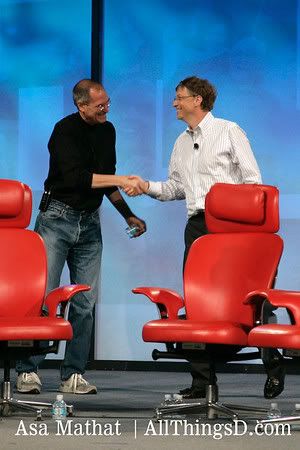
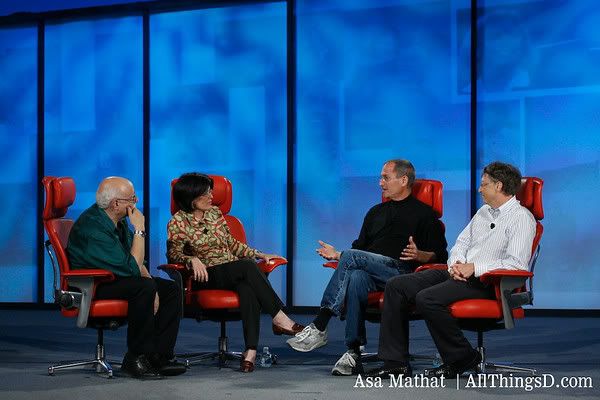
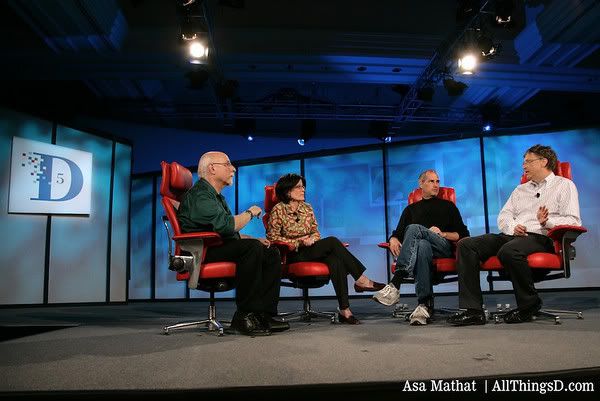
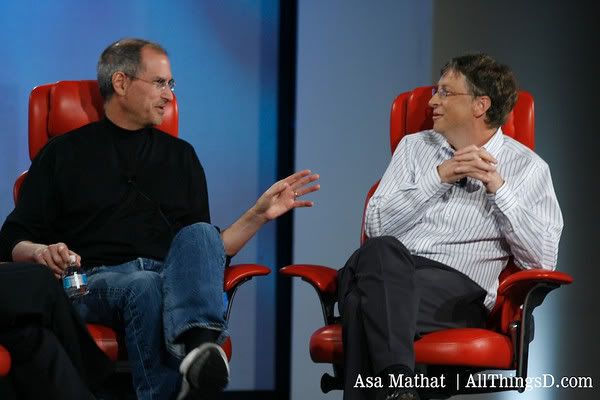
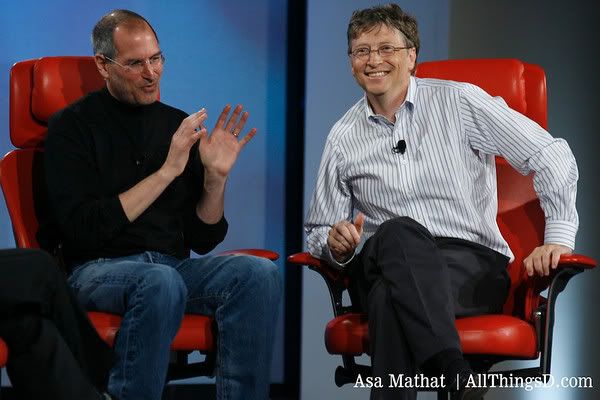
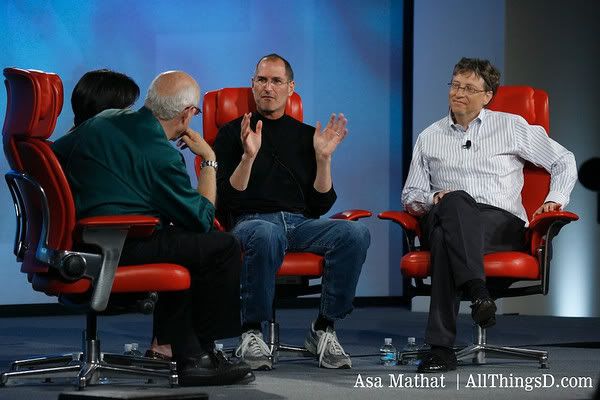
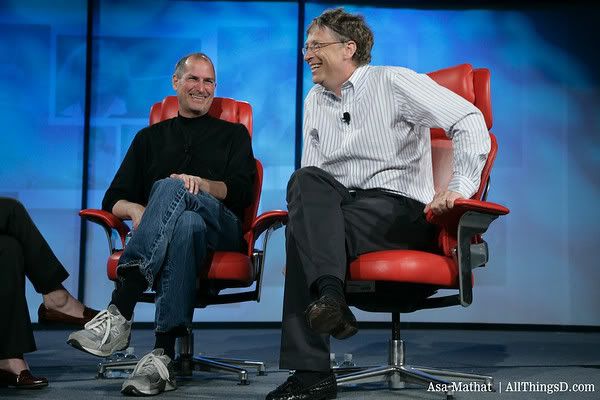
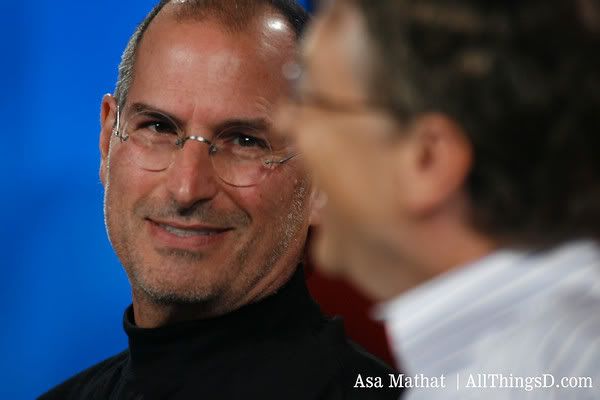
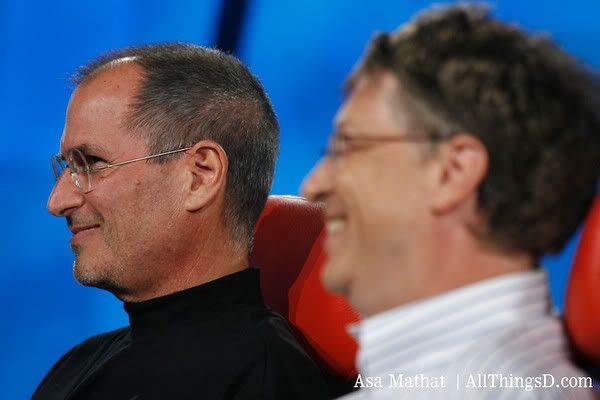
-
 Bill Gates and Steve Jobs at D5 - 13 - images
Bill Gates and Steve Jobs at D5 - 13 - images
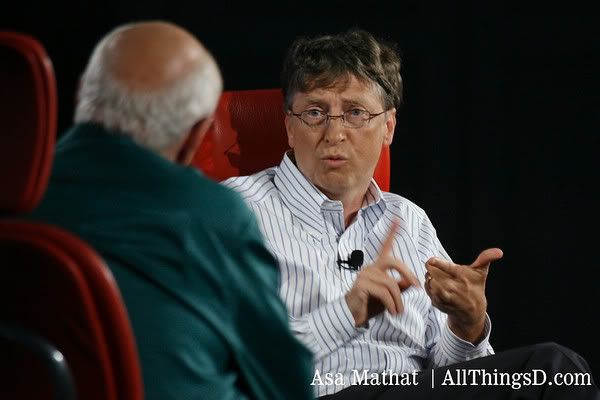
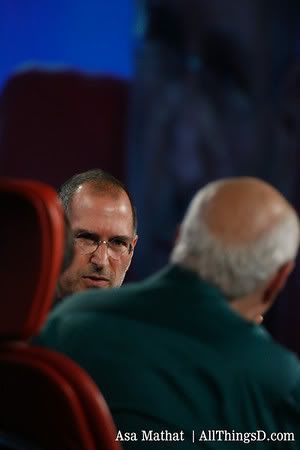
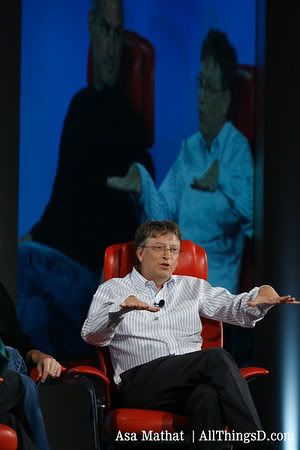
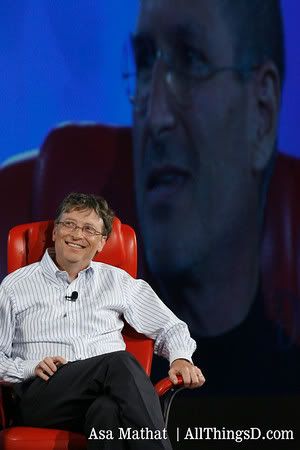
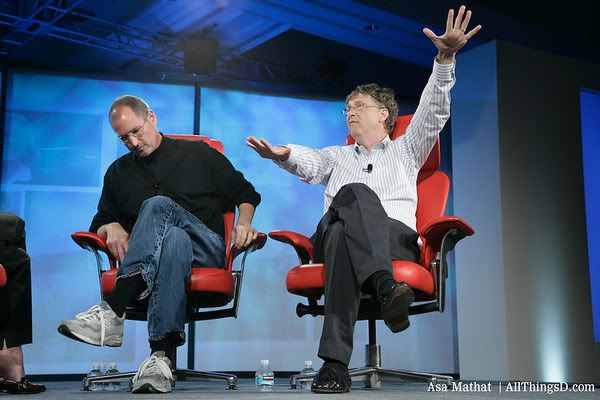
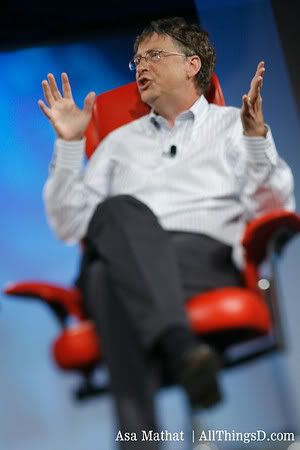
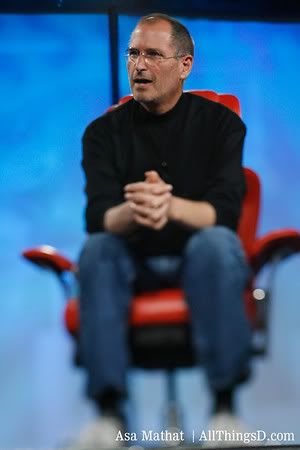
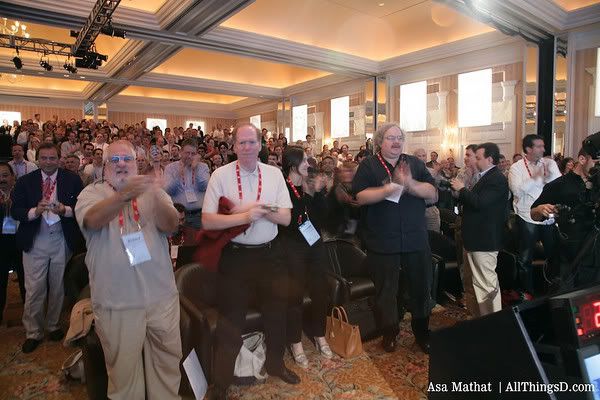
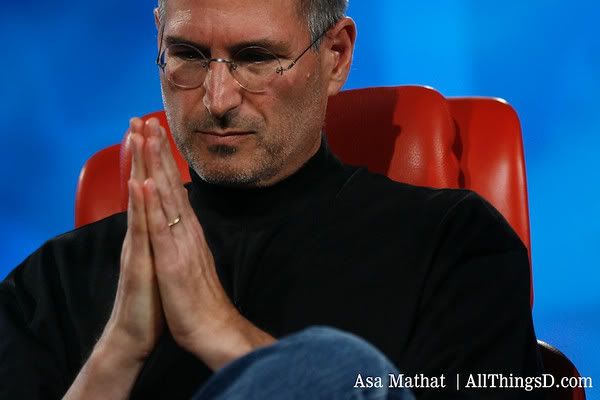
Extra links (from the Slashdot note linked on the first post):
cnn.com, timesonline.co.uk











 Reply With Quote
Reply With Quote
Bookmarks